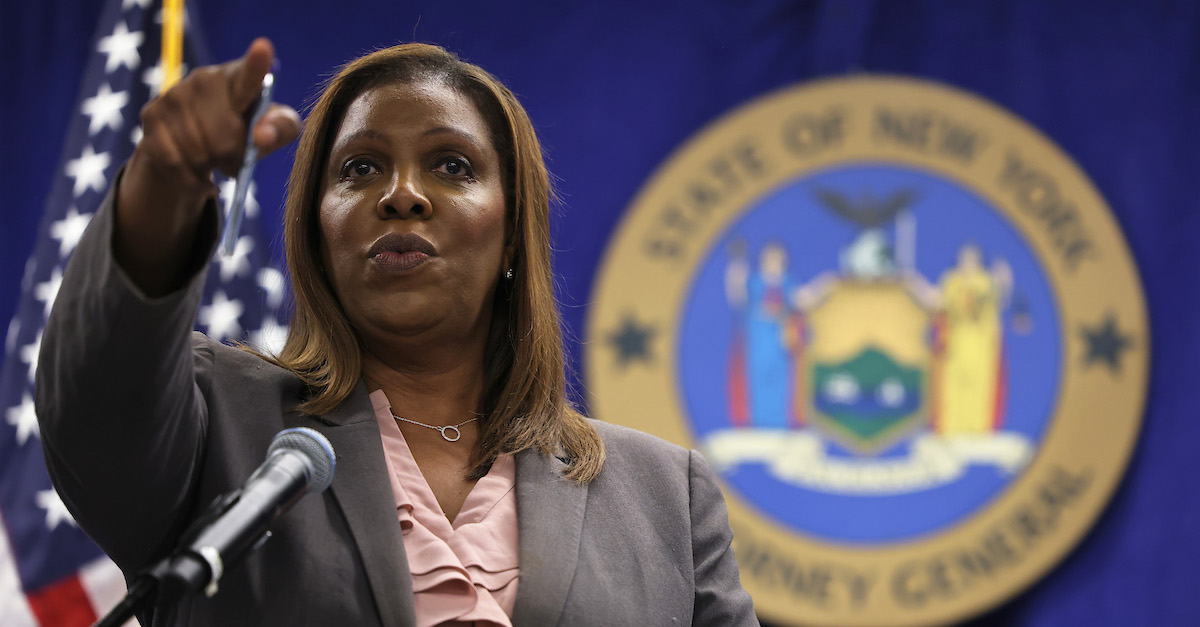
New York Attorney General Letitia James appears in a May 21, 2021 file photo taken at a press conference in New York City.
Teva Pharmaceutical Industries, Ltd., the Israel-based company that makes generic opioids, may have lied about its U.S. business and defrauded the court to shield itself from a judgment against its U.S. subsidiary, New York’s top prosecutor claimed.
Attorney General Letitia James (D) asked a judge to vacate the parent company’s dismissal from the case in order to conduct a hearing to determine whether Teva “committed a fraud on the court.”
“I made a promise to New Yorkers that we would do everything in our power to hold drug manufacturers and distributors accountable for their role in the opioid crisis that has devastated our communities,” James wrote in a statement on Monday. “By making misrepresentations to escape our reach, Teva Pharmaceuticals underestimated our commitment to securing justice for the people of New York.”
In December, a New York jury found Teva Pharmaceuticals USA and its affiliates liable for violating the rights of Empire State residents. James announced at the time that her work was not yet done, and she followed through on that announcement on Monday.
“We have already been successful in demonstrating the harm that Teva USA and others inflicted on New Yorkers, but this new evidence shows an even greater disregard for the pain and destruction that that this company fueled,” James said. “No amount of money will ease the trauma of those impacted by this crisis, but we will continue to stand up to Big Pharma and ensure they pay New Yorkers for the damage they caused.”
Dated Friday, the 31-page memorandum supporting its allegations accuses the pharmaceutical company of lying in court.
“To escape these proceedings, Teva Pharmaceutical Industries, Ltd. swore unequivocally to this court that it transacted no business in the United States and that it had no office, property, employees, or registered agent within the country,” the memo states, emphasizing the negatives in italics. “This is demonstrably false. By convincing this Court of these and other falsehoods, Teva Parent insulated itself from substantive discovery, and the likely finding of liability to flow from that, to which the State was rightfully entitled.”
In 2019, Suffolk County Supreme Court Justice Jerry Garguilo dismissed Teva Pharmaceutical Industries, Ltd. from the case for lack of jurisdiction.
“This Court took Teva Parent at its word and excused it from these proceedings,” the memo states. “However, that faith was misplaced and, without scrutiny now, it may result in an even greater injustice to the People of the State of New York.”
James claims that the corporate parent “shamelessly shape-shifts” in any way that will serve its “immediate purposes, regardless of flagrant inconsistencies in corporate form.”
“Among other facts that have come to light, Teva Parent directly maintained a contractually required facility in Cincinnati at the time it denied such ties to this Court, and later availed itself to the jurisdiction of this Court, appearing as a Plaintiff seeking relief and damages based on business it conducted from 2016 onwards under New York law,” the memo states, highlighting those words in original. “Sometimes, it is ‘identical’ to a U.S. subsidiary; at other times, it directly ‘develops, manufactures, and distributes a broad portfolio of pharmaceutical products in the United States and abroad.'”
Though pharmaceutical executives largely escaped criminal prosecution in connection with the U.S. opioid crisis, James counts a number of successes in obtaining compensation for victims. The so-called “Big Three” drug distributors — McKesson, Cardinal Health, and Amerisource Bergen — entered into a $26 billion global settlement, of which New York received a $1 billion share. Her office likewise reached a $230 million deal with Johnson & Johnson. Another deal banned the Sackler family from the opioid trade and shut down Purdue Pharma.
Teva Pharmaceuticals did not immediately respond to Law&Crime’s email requesting comment.
Read the attorney general’s memo, below:
(Photo by Michael M. Santiago/Getty Images)